|
|
|
|
|
|
George Borrow (1803-1881)
|
| George Borrow was born at
Dumpling Green near
East Dereham.
His father was a soldier in the West Norfolk Militia and
the family moved frequently when Borrow was young - a
pattern which may have contributed to his own
restlessness in later life.
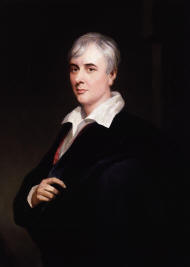
Portrait of George
Borrow by Henry Wyndham Phillips
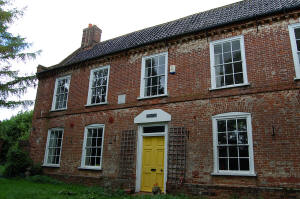
Borrow's Birthplace at
Dumpling Green
After the Battle of
Waterloo Borrow's father retired to a house on Willow Lane
in Norwich - now known as 'Borrow House'. (The house is tucked away
behind some modern
flats. Look for the plaque on the wall and then go under
the archway.)
At the age of 13 Borrow attended the
Norwich School in the
Cathedral Close where he was taught German by
William Taylor.
He was also flogged by Dr Edward Volpey the headmaster for his
rebellious behaviour. Borrow was a contradictory
youngster and liked to wander across Norwich - attending
fairs in Tombland, watching bare-knuckle contests or
talking to the gypsies on Mousehold Heath. (In those
days the heath was much larger than it is today.)
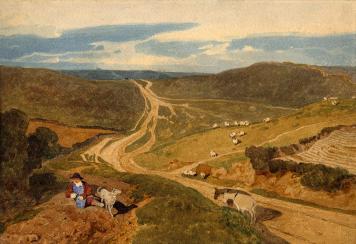
Mousehold Heath by John Sell Cotman Borrow
was tall (6ft 3) and energetic, but he suffered from manic
depression which brought him periods of deep depression
which he referred to as 'the horrors'. Borrow was also a
skilled linguist and taught himself Romany which enabled
him to strike up a close relationship with Jasper Petulengro. The gypsies used to refer to Borrow as 'the
word master'. In Lavengro (1851) there a passage
where Petulengro passes on his wisdom to the narrator:
|
|
'There's night and day, brother, both sweet things; sun,
moon and stars, brother, all sweet things; there's
likewise a wind on the heath. Life is very sweet,
brother; who would wish to die?' |
|
After leaving school Borrow became an articled clerk
with Simpson and Rackham - a firm of solicitors in St.
Giles Street. However, he soon found this intolerable
and joined the Bible Society which enabled him to travel
on the continent. He famously walked the 112 miles from
Norwich to London for his interview in 27 hours. In 1843
The Bible
in Spain was published and the book was an instant
success.
Borrow was a striking looking individual -
due to his height and his blonde hair. He was also
fearless and thought nothing of spending time in the
company of bandits and robbers. Ill at ease in polite
society, he was constantly drawn towards wild places. He
was also physically strong and, even at the age of 50,
while living in Yarmouth, he entered 30ft waves to
rescue a sailor whose boat had overturned. In his poem Lines to Six-Foot Three Borrow
described himself as follows:
|
A lad, who twenty tongues can talk,
And sixty miles a day can walk;
Drink at a draught a pint of rum,
And then be neither sick of dumb;
Can tune a song, and make a verse,
And deeds of Northern kings rehearse:
Who never will forsake his friend,
While he his bony fist can bend;
And, though averse to brawl and strife,
Will fight a Dutchman with a knife. |
|
While working
as a clerk in Norwich he also
mastered Welsh which would inspire his later guide Wild Wales
(1862). But it is for his semi-autobiographical novels
Lavengro (1851) and Romany Rye (1857) that
he is best remembered.
In Chapter 14 of Lavengro there is the
following famous
description of Norwich:
|
|
'A fine old city, truly, is that, view it from whatever
side you will; but it shows best from the east, where
the ground, bold and elevated, overlooks the fair and
fertile valley in which it stands. Gazing from those
heights, the eye beholds a scene which cannot fail to
awaken, even in the least sensitive bosom, feelings of
pleasure and admiration. At the foot of the heights
flows a narrow and deep river, with an antique bridge
communicating with a long and narrow suburb, flanked on
either side by rich meadows of the brightest green,
beyond which spreads the city; the fine old city,
perhaps the most curious specimen at present extant of
the genuine English town.' |
This view of Norwich if from Mousehold Heath and the 'antique
bridge' is Bishop Bridge - which spans the
River Wensum.Borrow
is usually credited with originating the term 'a fine
city' - however he may have been influenced by William
Cobbett's Rural Rides which contains this
sentence: 'Norwich is a very
fine city, and the castle, which stands in the middle of
it, on a hill, is truly majestic.'
Modern readers may find
Borrow's books rather unstructured, repetitive and
meandering - but they are filled with poetic moments and
worth delving into.
|
|
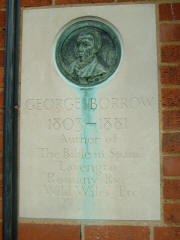
Plaque outside Borrow
House
|
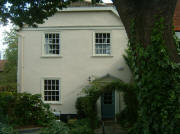
George Borrow House
|
|
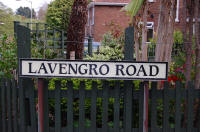
Lavengro Road |

Vinegar
Pond,
Mousehold
Heath |
After retiring from the Bible Society Borrow married
Mary Clarke who he had met in Spain - and the couple
eventually settled at Oulton Broad in Suffolk. It was
here that most of his books were written. However,
they also spent time in both Great Yarmouth
and London.Borrow's work
received mixed reviews from critics and towards the end
of his life he became a lonely figure - cut off from
society and uncertain of his own literary standing. He
died at the age of 78 at Oulton and is buried in the
Brompton Cemetery in Kensington in London. There is a
memorial to him inside Oulton Church.
In 1994 Borrow House was sold and the money was used
to establish the George Borrow Trust which aims to
preserve and promote Borrow's works.
See also Dereham and
Earlham.
|
Links:
More George Borrow Location Photographs
George
Borrow Trust |
|
|
|

